Hello,
This is a diagnosis that needs to be provided by an inperson examination. In some cases an X-ray can help and in others a CT is needed. Please don’t diagnose without a vet doing an exam on your dog.
Hi. I am the proud momma of an amazing dachshund named Gia. Gia is a nine year old beautiful girl who hurt her back on the 18th of September. So far we have gone to the vet twice and one ER visit. Gia is currently taking pain medication and a muscle relaxer all of which are helping with the crate rest. My question is, how long before she starts to feel a little better? I heard that 6-8 weeks of crate rest at minimum, and I am worrying because this is the first time that I have seen Gia be so lethargic. The YouTube videos that I saw were extremely encouraging to a person who is going through an IVDD suspect injury.
Hello,
I am searching for a vet to help me with my dog Hazels tooth extractions (right molar). She is in much pain and does not want to eat. If she eats, she eats very slowly. Any information on pricing, veterinary clinics, and scheduling will be greatly appreciated.
Thank you!
Bryan
Comments
Hi, while looking for information about my 15 yo beagle’s combination of symptoms, I came across IVDD and a youtube video about Hank by Dr. Krista Magnifico. Several years ago, my beagle started having short tremors that would last a few seconds. Those are fairly common now, occurring multiple times an hour. Last year, she became incontinent at night, and leaked sometimes during the day. She is on Proin for that, and it has mostly stopped that issue. And in the last few months, her legs have started giving out from time to time. She doesn’t seem to act like she’s in pain, though she pants a lot, but always has, especially in the evenings. I have some short videos showing the tremors and her legs giving out, and I can provide you a link to Google photos if Dr. Magnifico would view them and let us know if it looks like IVDD or not. Thanks!
Comments
My cat is home from a 3 day stay at the ER with FLUTD. He was partially blocked. His kidneys suffered slightly. He was sent home with pain medication, antibiotics, and something to relieve him of urethral spasms. It has already cost me $2700 and I cant possibly offered another stay as he isn’t peeing too well already after 24hours being home. He is still only trickling pee rather than fully expressing his bladder. What do I do? I can’t afford another hospital visit.
Comments
hi, i got my cat spayed two weeks back, and she has developed this swelling behind her skin sutures one week after the surgery. there’s no discolouration, or tenderness, or drainage of any kind from the sutures. the swelling itself feels firm, and soft tissue-esque. my cat herself doesn’t show any signs of discomfort/pain either. no loss of appetite, no diarrhoea or change in bowel movements, no change in behaviour, no lethargy, etc.
this is my first pet, so i don’t have any experience in the post-op recovery of cats, and what is considered normal or not. also i live in a super remote area, and the vets in my town are more experienced in cattle, so taking her to them was of no help. they think it’s an infection or hernia. i don’t think it’s either because there are literally no signs of infection, the wound is absolutely clean, and it’s not hernia because it’s doesn’t reduce (and if it were at a strangulated/irreducable stage, there are no systemic signs to support that diagnosis).
the hospital where i got her spayed at is in a different city, and i talked to the surgeon who performed the surgery on the phone, and going by the pictures, he thinks it’s probably a seroma. he absolutely shot down the hernia possibility, because he says they put uninterrupted sutures, so the chances of hernia are very rare.
my local vet has put her on a ceftriaxone plus dexamethasone (intramuscular) regimen, for 4 days to see if the swelling improves or not. but i am not super confident about their judgement since they are not experienced in cat physiology, at all. they didn’t even consider it could be a seroma, i had to explain it to them. i just need to know what are the chances of it being something serious, because if it’s only a seroma, or a reaction to the internal sutures getting dissolved, i’d rather not have her uselessly medicated.
so, tl;dr how does a seroma swelling feel like? and how do you differentiate between a swelling due to seroma, or because of the body’s reaction to internal sutures healing?
Comments
Please could you give me some advise. I got my dog (1year old) castration due to cryptorchidism. Day1 – After the surgery he was very bruised. Day2 – He was happy, eating, drinking but very sore. Day3- Abdomen started to swell. Day4- Abdomen was very swollen, bruised and slight clear weeping from incision. Visited the vet who said it was fine. Day5- Extreme swelling (see pic) so I took him to the vet again who give more pain/inflammation meds. Day6 -Swelling has ruptured leaving a whole in his abdomen (see pic) Visited the vet again who give 6 day supply off antibiotics and advised to clean twice daily. The vet didn’t clean the wound and advised it didn’t need stitched closed. Day7 – My dogs eaten and drank but has spent most of the day sleeping. I’m so worried that he has a large whole in his abdomen, how’s it ever going to close! Also why would this happen! Thanks for taking the time to read.
Comments
Four years ago this week, my dog Connor was released from a Baltimore-area veterinary orthopedic and sports medicine hospital after THREE failed TLPO surgeries and multiple significant infections, which created the beginning of Connor’s end. The reminders of this are coming up daily in my Facebook “Memories” feed, which is why I’m currently wrestling with taking action four years after the fact. Connor completely tore his CCL and the ortho surgeon sold me–HARD–on TPLO for him. This same practice and surgeon had successfully repaired a torn CCL for another of my dogs, Tessa, when she was five and a half years old. Connor was 13, and the surgeon was all but guaranteeing success, citing examples of 12-year-old Great Dane patients who regained great quality of life and movement. Connor fell off a ramp getting out of our car and three of the six screws broke after the first TPLO surgery. The surgeon did a second TPLO surgery, after which Connor went NOWHERE and did NOTHING, and the screws failed again. Plus, the second time, he developed an infection so bad I mistook the stench for a sewer problem I was having in my house. When the vet intern cut off his splint and dressing, what was inside was bright green and smelled horrendous. I’d been mistaking Connor’s crying and balking as stubborness, not recognizing he was in PAIN. The staff whisked Connor away to the back and kept him for more than a week. MONTHS later, one of the vet techs told me they weren’t sure he was going to make it that first weekend (our appointment was Saturday; while they were typically closed on Sunday, they had this staffer with him around-the-clock, doing regular debriding they didn’t tell me about). The third surgery involved an external fixator I was cleaning multiple times a day. When they found out I was doing this, I was yelled at and told to only clean it once a day. I followed the directions–and another significant infection developed. There were multiple instances of their applying splints in ways that hurt my dog, and I ultimately had to move him to another veterinary ortho practice because the surgeon who performed the surgery, the vet who owned the practice and finally the office manager (who had been the final person who would even respond to my calls and letters) stopped responding. Second and third opinions were that Connor developed a bone infection so severe he might not recover–because a fragment of screw had been left behind from one of the first two surgeries. He ruptured a disk in his back trying to manage the awkward splints the first ortho vet used. The second ortho vet did an MRI–discovering the TWO ruptured disks (one was several years old and had been misdiagnosed by the original vet ortho and sports medicine practice as a “congenital defect”). I went ahead with the spine surgery–within three hours in recovery, Connor pushed the baby-gated pen he was in around a corner. The second surgeon was amazed, and said to me, “Younger dogs who recover perfectly well from this surgery can’t even stand at this point–Connor is rearranging the furniture. I can’t imagine how much better he must feel right now to be doing that.” But the leg wasn’t healing due to the infection, and I finally conceded that, despite my best intentions to give him back his mobility and his life, the decision for TPLO actually made his last year of life miserable and then forced me to put him down. (And I can’t even tell you about the in-home “euthanasia” service–it was so horrible I still weep thinking about what happened there, more than three years later.) With this brief (really!) background, would it be unreasonable of me to file a complaint with the state veterinary licensing board? It’s only now that I realize THEY made mistake after mistake, didn’t fully advise me of the situation and options, and caused me to put my dog through pain and misery that wasn’t going to help him improve. I’ve been really fired up about this complaint this week, but then I read your blog about euthanasia and how clients can be unreasonably cruel, and I need to know if you think there would be anything gained from the practice having to answer for their decisions (which include blaming me and refusing to talk to me or treat my dog until I fully paid them ongoing bills that were supposed to have been covered under the “guarantee” they provided in writing.) I really appreciate your taking the time to read this long post and offer your advice.
Comments
my 7 year old dog, we aren’t sure of breed, but we think a lab/beagle mix of some sort experienced extreme pain and loss of the use of his back legs 2 days ago. I immediately took him to the emergency vet. They told us med management and cage rest. They brought him to the car with the use of a sling for his hind legs stating he still had some movement of his hind limbs intact. 2 hours later I believed he had declined and had no use. I called back to the vet who made me feel guilty for asking for further evaluation stating she would not put a dog through an MRI and surgery that still exhibited neurological function. He cried all night long and every time I moved him to potty was in excruciating pain. he wouldn’t eat and no longer could void. I took him back to the vet the next morning where he received an MRI and underwent surgery for a ruptured disc. at that point he no longer had deep pain sensation. My question is did that delay diminish his chances of recovery? and what are the odds now? I’m just heartbroken for him and do not want him to suffer. I am a nurse practitioner and very willing to provide the care he needs however I don’t want him to be in long term pain or have a poor quality of life.
Comments
My sweet little Josephine is 2 1/2 years old and has herniated discs in her back and also has severe heart failure in the right side of her heart. I have to make the heartbreaking decision of whether or not to take the chance on anesthesia to repair the disc herniation since a week of sedation and pain medication has not produced any improvement on her motor skills (she can’t stand and poop or pee and her appetite is waning) and risk complete heart failure, or take her home and try other alternatives to back surgery. The doctors tell me that the results of the EKG tell me that I only have about 2 more years with my little girl given the condition of her heart. Do I do the back surgery? Are there successful alternatives?
Comments
I have a question about our 13 yo dog who likely has a bulging disc. He is a mutt (probably part Border Collie, part Shepherd). Soon after a small slip on our stairs, he had lameness in his one back leg; this went away after one day, he limped for a few days after, and he quickly recovered from those things. Though he was walking fine fairly quickly, he showed stiffness, showed hesitation going up stairs unless we gave him a treat (we have only stairs to the outside), and his tail was down and only wagged from the tip of it. We had him quickly on an anti-inflammatory (Novox) and a pain med (started on Gabapentin but had to discontinue). He was fine on a walk; we went on short walks and he always craved for much more than we allowed. We prevented jumping, aerobic exercise, stopped him from using stairs by having a ramp to the outside, etc. We continued the Novox. His symptoms continued, then got better, and then seemed to regress when he started showing signs of pain (panting even when lying down and even when it was cool outside and some anxiety); the pain thing was probably because of taking him off Gabapentin. We took him to the Neurology Dept at a local, large vet hospital and a physical exam indicated that he “likely” has a bulging disc. When they inspected his back, he showed signs of pain and anxiety and his back legs bent and his rear went down. We don’t think we want to do surgery due to his age. He has not had an MRI as the regular vet and my husband and I thought that the treatment would be the same if we did not do surgery — treatment being restricting movement, continuing anti-inflammatory and pain meds, and looking into possible physical rehab. A switch to the pain med Amantidine helps a lot and the panting and anxiety are gone. He now continues to crave longer walks and, at the rare times we forget to block off the couch, he will try to jump up on it. We have been continuing to restricting movement but we just don’t know what to do about activity restrictions and have not had a lot of advice from neurology. He has always craved movement and exercise and when we take him around the block his stiffness seems to go away a bit and he seems energized and maybe even more comfortable. He has always craved a lot of exercise and movement. His spirits are lowered a lot if we keep in him in a small space — it almost seems like he wants to move around. He is eating and drinking, can do #2 (though he struggles some if doing it a long time). If allowed to do some movement, he is mostly happy and getting around with walking. Questions are: Should we restrict his movement altogether despite all this? Should he we do no walks at all? Is it bad if he is free to walk around the first floor or should he stay only in a very small area? I feel we are so confused as to what to do and how to know how to prevent regression. We’d love the input of any veterinarians or other owners with the same experience!






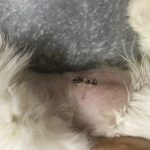
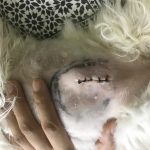
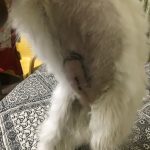
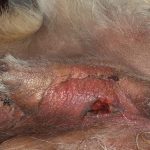
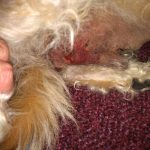



Hello,
Have you asked your vet for assistance? In many cases your vet can do the procedure? Or refer you to someone who can.
Yes, please get her treated ASAP. Poor Hazel!